Now the Lord is the Spirit, and where the Spirit of the Lord is, there is freedom.
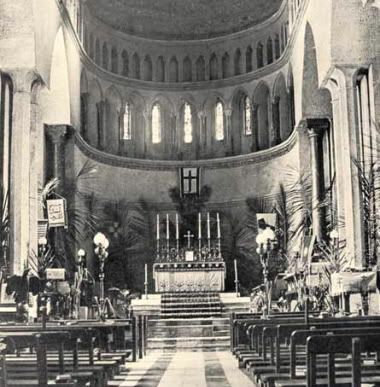
This past Sunday, the Primates of the Anglican Communion went on a pilgrimmage to the island of Zanzibar. A High Mass was celebrated by the Archbishop of Tanzania in Christ Church Cathedral (pictured above and below). The cathedral was built on the grounds of a former slave market when it closed in 1873. It has the shape of a Basilica with a blend of vernacular Gothic and Arabic styles. It was constructed with reinforced concrete mixed with crusted coral stone. The external walls are covered by crenellations and recesses ending in tri-foil arches. The clock on the tower was a gift from Sultan Seyyid Barghash (1880).
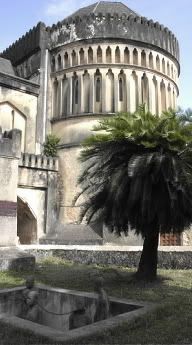
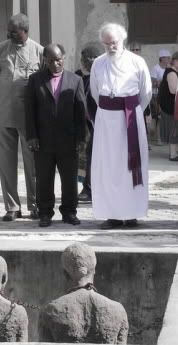
Romans 8:20-21
For the creation was subjected to frustration, not by its own choice, but by the will of the one who subjected it, in hope that the creation itself will be liberated from its bondage to decay and brought into the glorious freedom of the children of God.
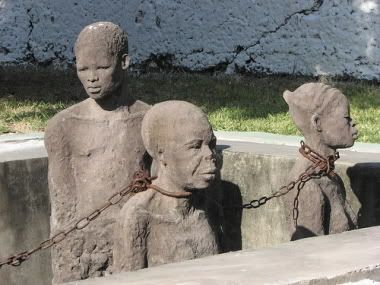
A slave chamber is preserved next to the cathedral. The interior of the church is full of reminders of the slave trade. Dr. David Livingstone, the explorer, doctor, anti-slave activist, is commemorated in a stained glass window. There is also a crucifix made of the wood of the tree under which Livingstone’s heart was buried. It was his explicit wish that his heart should remain in Africa. Next to the altar, the place set apart for the "continual recalling of the sacrifice of [God's] Son" (BCP, p 574), is a red circle marking the spot of a whipping post. Slaves were tied to it, then whipped to test their strength and resilience before being sold.
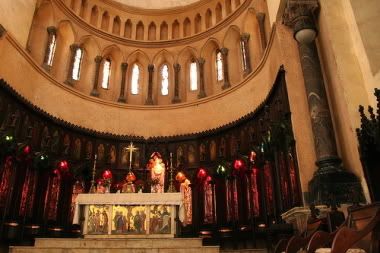
Galatians 5:1
It is for freedom that Christ has set us free. Stand firm, then, and do not let yourselves be burdened again by a yoke of slavery.
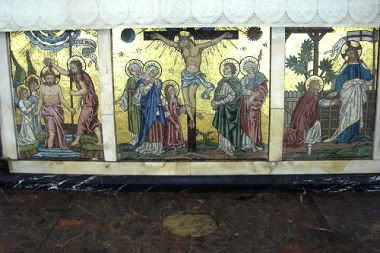
1 Corinthians 7:21
Were you a slave when you were called? Don't let it trouble you—although if you can gain your freedom, do so.
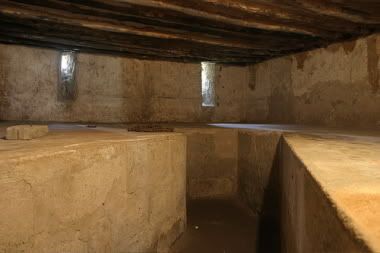
Fr George Congar described the Mass in his report for the Living Church :
. . . the primates sailed two hours by boat to Zanzibar to celebrate a solemn Eucharist at the Cathedral Church of Christ, also known as the Universities Mission to Central Africa (UMCA) Cathedral. Considered the most "Catholic" of the traditional mission societies, the UMCA heritage was evident in the color, music and liturgy of the Holy Communion service drawn from the 1662 Book of Common Prayer.
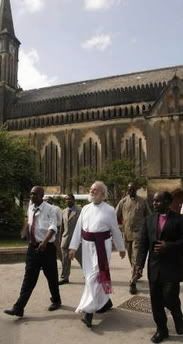
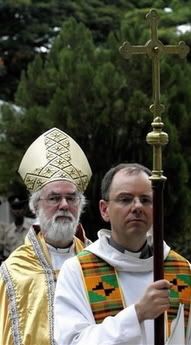
Over 600 worshippers packed the Cathedral, built in 1878 on the site of Zanzibar's former slave market in Stone Town. Archbishop Williams served as preacher, Archbishop Donald Mtetemela of Tanzania served as celebrant and the bishops of Zanzibar and Dar es Salaam served as deacon and sub-deacon in the elaborate Anglo-Catholic service which was conducted in both English and Swahili.
In high ritual style, Archbishop Mtetemela sung the liturgy, as clouds of incense arose from a censer held by the former Archbishop of Zanzibar, John Rahamdhani. The altar service reflected an ecclesial style seldom seen in The Episcopal Church, with copes, maniples, zucchettos and other finery. Yellow roses covered the front of the altar and much of the cathedral in honor of Quinquagesima Sunday.
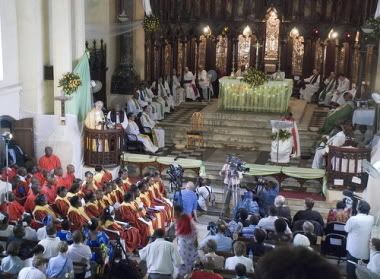
Following a processional choir of 40 down the aisle to the hymn "Jesus Shall Reign," the primates proceeded down the aisle under a barrage of klieg lights and flashbulbs from the press, with 12 of the 14 new primates seated in canon's stalls around the high altar and the remaining primates seated in the stalls.
At the close of the service Canon Matthew Mhagama offered thanks to the Catholic missionary societies of the Church of England for planting the faith in Central Africa, and to the British Royal Navy for crushing the slave trade. "Whatever their shortcomings," the missionaries of the UMCA were "heroes." Their graves surrounding the cathedral were a testament to the power of the gospel and to their sacrifices for the "Catholic faith," he said.
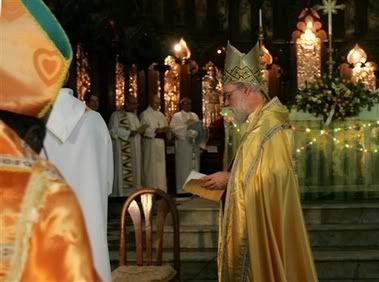
The sermon was given by the Archbishop of Canterbury. As Bob Williams of the Episcopal News Service reported:
From its carved pulpit, Williams preached a homily based upon scripture lessons addressing Genesis's account of the rainbow after Noah's flood; the ‘patient, kind’ attributes of love as expressed in I Corinthians 13; and Luke's gospel account of Jesus restoring the sight of the blind man on the road to Jericho.
‘Today it is very appropriate to think how God makes us see,’ Williams said. ‘One thing we might reflect upon today is what thing are we blind to - who is it now whose suffering we cannot see, we cannot understand. ‘In some societies it may be women, the elderly, or children,’ he said. In others, ‘it may be minorities of one kind or another.... It is the case in our wealthy countries that we don't see the realities of suffering in other parts of the world.’
These international connections were underscored at the service's conclusion when the Archbishop installed Ugandan-born Hellen Wangusa as Anglican Observer at the United Nations.
God's love helps believers see ‘who we really are’ ... and ‘truly because of that we see others in new ways. ... So we begin to be able to set about the task of setting others free ... the chains, the shackles of our own fears fall away.’
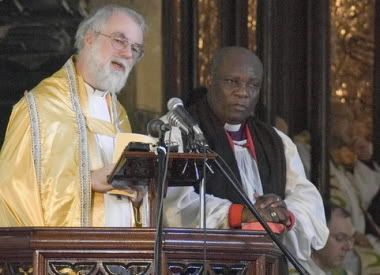
Williams cited the conclusion of hymn writer-priest John Wesley, who said near the end of his life, ‘I remember two things: that I am a great sinner, and Jesus is a great Savior.’ The congregation had earlier sung Wesley's classic ‘Amazing Grace’ as part of its ‘Act of Commemoration, Reparation, Hope’ repenting the evils of slavery.
Hymns and prayers alternated between Swahili and English during the liturgy, with loudspeaker calls to prayer from the neighboring mosque occasionally overheard between organ strains.
Most Zanzibaris are Muslim, dating from when the island was colonized and under the rule of Oman's Sultan before becoming a British Protectorate. In 1964, Zanzibar and the mainland Tanganyika were joined into the united nation of Tanzania.
. . . ‘This church is seen as God's intervention in human affairs through men and women of good will,’ notes diocesan secretary Nuhu J. Sallanya, writing about the cathedral. ‘The place of horror and despair has been transformed’ into an ‘area of worship and praise.’
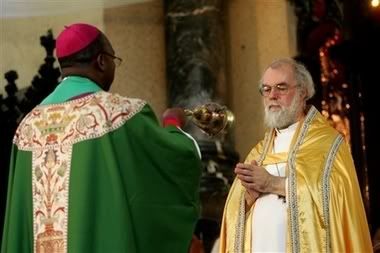
Unfortunately, the event also highlighted the unhappy divisions in the Anglican Communion. Somehow, it seems fitting that our wounds of communion would be most visible in a place which has known so much wounding like Zanzibar. The hosting province had previously declared its communion with the Episcopal Church (minus the faithful remnant) to be "severely impaired." It was also reported that the primates were in widely divergent dress, from business suits to cassocks to choir dress to eucharistic vesture. Six primates attended, but would not receive Holy Communion on that occasion. The customary group photo was canceled. It was also reported that the pilgrimage received a hostile reaction from a Sheikh who wrote in the local newspaper that the visit would promote sexual immorality and cause scandal in the community.
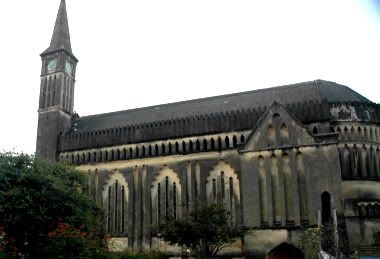
To see more and larger pictures from the event, please visit Scott Gunn's collection at Flickr.com.


3 comments:
Uh, not to nitpick, but John Newton wrote "Amazing Grace," not John Wesley...
I noticed that too, but I thought I should just leave the quote untouched.
I don't think it's accurate to report on this gathering without mentioning the discord in the Anglican ranks over being forced to sit in the presence of a mere woman.
From telling-secrets:
"At a gathering of the Primates of the World-wide Anglican Communion in Dar es Salaam, Tanzania, seven of the 35 Primates present refused to have Eucharist with the Primate and Presiding Bishop of The Episcopal Church, the Most Rev’d Katharine Jefferts Schori. They said they could neither accept her ordination as a woman, nor her theology, which is accepting of LGBT people." Without pointing this fact out, we would all have been guilty of a sin of ommision.
Post a Comment